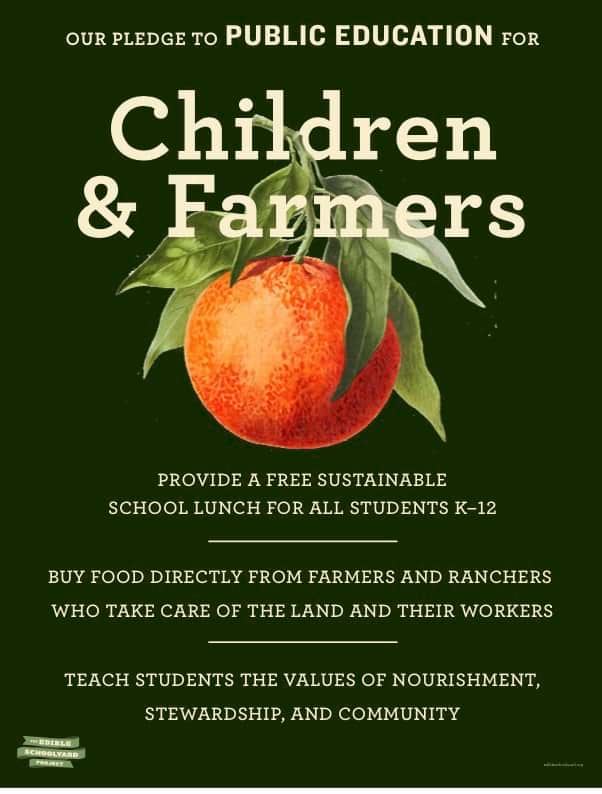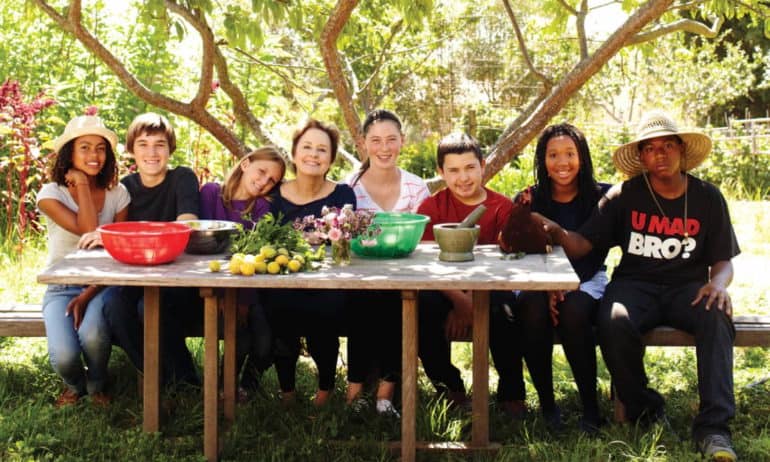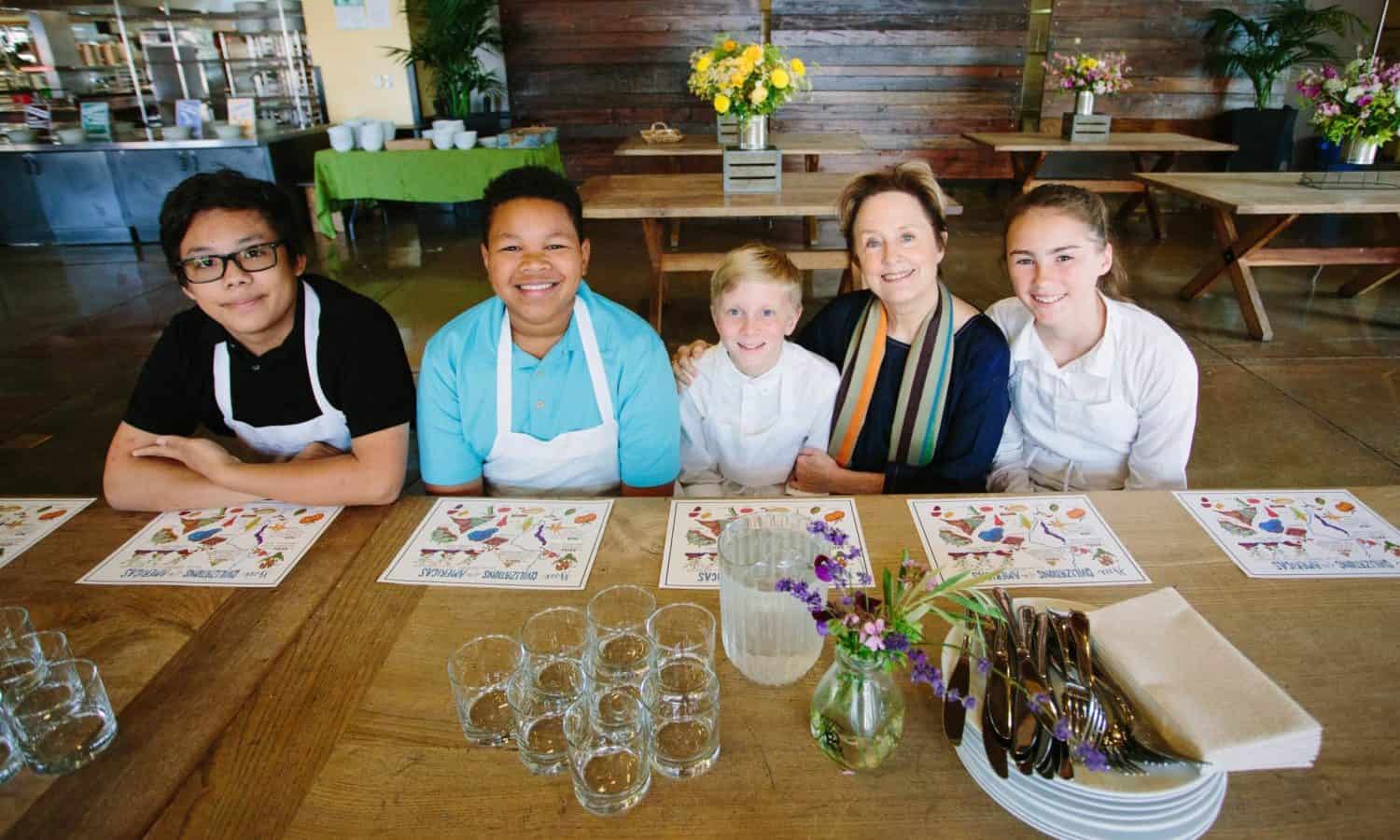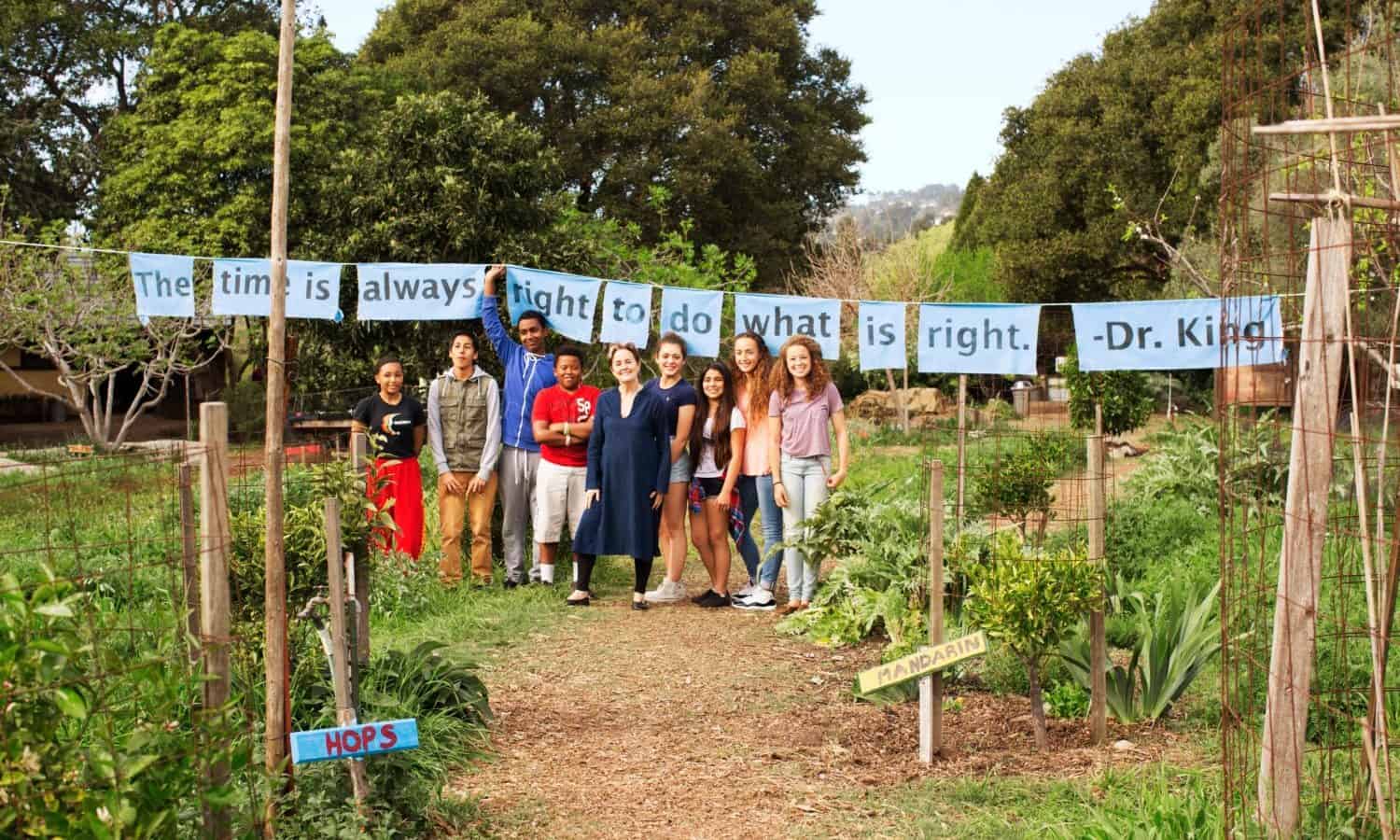Food Tank: Free, Sustainable School Lunch for All, a Pledge from Alice Waters
Contributing Author: Sarah Axe
For almost 50 years, Alice Waters has used food as a catalyst for social, environmental, and political change. Now, she is advocating that schools across California adopt a pledge to offer a “free, sustainable school lunch for all students K-12.” Waters proposes that schools source their food directly from farmers and ranchers who take care of the land, transforming school lunch into something that is “civil and meaningful,” and she claims costs will remain the same. Using California as a model, Waters hopes that schools across the United States and around the world embrace this pledge.

Pledge to Public Education for a Free, Sustainable, School Lunch for All. Photo courtesy of Amanda Marsalis.
Schools, like farms, are becoming increasingly industrialized, focusing on productivity through test scores and minimizing costs through food choices, according to Waters. “Cafeterias have been so contaminated by fast-food culture, it’s a free for all. It doesn’t smell good, it doesn’t look good, it doesn’t have any connection or pleasure for students,” Waters says. Even at King Middle School, home to the Edible Schoolyard Project (ESYP) and with a cafeteria that sources locally, grows organically, and cooks from scratch, there remains a stigma about school lunch.
Politicians have the power to advocate for a universal edible education. “To not do this is to ignore climate change, to ignore the health of the nation, and to ignore the crises of inequality,” says Waters. Her vision is to foster deeper connections between children, farmers, and their food within the school cafeteria. Head Chef Teacher Esther Cook explains that this pledge is about harmoniously benefiting both the school lunch program and the farmers. There is a “huge opportunity to appeal to people’s humanity, farming and cooking for children is such meaningful work that one could have.” says Waters.
Starting in 1971 with the opening of Chez Panisse, Waters has helped generate deeper connections between people and their food by supporting farmers, celebrating seasonality, and dazzling taste buds with simple and delicious food. The ESYP enables children to develop similar connections by allowing them to study academic subjects within the kitchen and garden classroom. Through this pledge, principals and school districts will commit to purchasing food directly from local, sustainable farmers and ranchers, teaching students the “value of nourishment, stewardship, and community.” For Waters, this is a pursuit of true social justice, and if embraced in California, it has the potential to transform the American school lunch system.
Free, universal, public education is a cornerstone of American democracy, and yet, according to the Pew Research Center, the U.S. ranks in the bottom half of more than 70 countries that uniformly measure educational outcomes. Many American schools are not only dragging students further behind their international counterparts, but racial and income achievement gaps within the U.S. are also widening. Simultaneously, according to the Centers for Disease Control and Prevention (CDC), childhood obesity in the U.S. is at critically high levels, with more than 18 percent (nearly 14 million) children affected, reaching between 19 and 26 percent for low-income and children of color. The school cafeteria, a nexus for children and health, is degenerating, churning out less than delicious food—often wasted—and failing to nourish students.
Waters sees an opportunity to change the stigma surrounding school lunch. Cook asks, “Why have we accepted that school lunch is not great? And that it’s acceptable for kids to say, ‘we don’t like the food.’’’
Schools can influence the future of the food system by changing food sourcing and education. For Waters, to continue along the current path by offering unhealthy and unappealing meals, supporting large industries, ignoring the climate, and bypassing the connection between the food and the farmer is immoral.
Creating a school-supported farm model, says Waters, “where schools adopt farms and agree to buy all of their organic, sustainable produce instead of going through the middleman or bureaucracy of the government,” is an opportunity to support the stewards of the land. “I want the farmers to feel like we have their back, just like we do at Chez Panisse,” she says. There are inequity and abundance, and “to do something beautiful here would awaken us all,” she continues, “you can give the farmers the money and support they need, and you get wholesome food in return.”
Waters is not alone. A 2016 report from the Union of Concerned Scientists found that, in Iowa, if 25 percent of medium to large-scale institutions purchased their food locally, it could generate more than US$800 million annually for the state’s economy. Waters argues that if schools buy directly from the farmers, their costs would be no higher. ESYP Program Manager Hana Lee explains that this would create a lasting cultural and rural economic benefit, offering farmers a viable and guaranteed income while reigniting excitement and joy about the food that is cooked in the cafeteria.
Leading models in the movement to transform school food procurement include the Good Food Purchasing Program, the Conscious Kitchen, the Chef Ann Foundation, and the Northwest Food Buyers Alliance. These organizations recognize the impact of transforming institutional procurement away from large management and distribution companies to local vendors who value health, human and animal welfare, and the environment on a large-scale policy level. They are helping not only schools across the country, but hospitals, event venues, and correctional facilities to strengthen their models around food sourcing. “Alice is seeing this momentum and I think she’s really trying to make it catch on through this pledge, asking, ‘how do we all collaborate and make this a statewide initiative?’” says Lee.
Shifting procurement policies at this state level, says Waters “has to do with the stewardship of the land, feeding and nourishing children, and communicating with everyone else on the planet, which are the fundamental values that we need to survive.”


